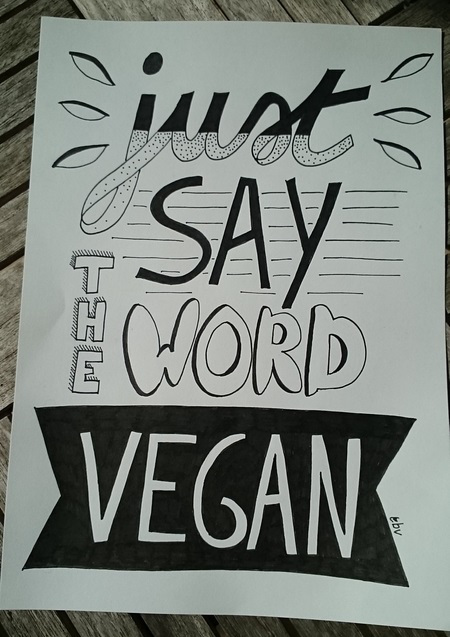Although veganism is on the rise, and the numbers of vegans is steadily increasing, there are some within the vegan movement that shy away from using the word vegan in advocay and campaigning. Even some animal advocacy organisations use plantbased, or obscure acronyms like veg’n or even veggie instead of vegan. This seems to be informed by the idea that the word vegan is a deterrent and scares people away, supposedly hindering them from making lifestyle changes that would benefit animals. The main reason why the word vegan is seen as a deterrent is that it is perceived as something ‘extreme’, or on a personal level, associated with ‘extremists’ and ‘fanatics’.
First, the alternatives mentioned above hardly carry the same meaning as the label vegan. Veggie can refer to vegetables, but is also used to refer to lacto-ovo-vegetarians (thus including the use of eggs and dairy). Plantbased refers to a diet that focuses on whole plant foods (and in short: no processed foods like sausages and burgers, even if they do not contain animal products). Both veggie and plantbased in essence refer to a diet (what one eats), while being vegan goes beyond diet (and transpires in all aspects of life) and is a justice issue. Lumping vegetarians and vegans together under the acronym veg’ns might serve some generalising descriptive reasons, but it fails to appreciate the big ideological gap between vegetarianism and veganism.
If people hardly ever hear the word vegan, how can we expect them to embrace the philosophy of veganism?
Second, associating veganism with something ‘extreme’, or associating vegans with an image of aggressive or fanatical activists, is a false portrayel. It hardly does justice to the reality that vegans come in all sorts. Yes, there might be some who resort to some extreme or aggressive tactics to get the message across, but there are also many – if not more – who do that in a friendly and ‘softer’ manner (by which I’m not saying anything about which method is the ‘best’, that can be the subject of later blogposts). The ‘angry’, ‘aggressive’ or ‘extreme’ vegan is a steretypical portrayel that is happily fed and fostered by opponents of vegan advocacy and campaigning. Vegan advocacy can, and most often is, friendly, compassionate and caring. Veganism is afterall a philosophy based on compassion, respect, rights and justice, and there’s nothing extreme about that.
Third, the omission of the word vegan entails a vicious circle: the less the word vegan is used in mainstream language, in books, magazines, on menus, in advertising and campaigning, the less likely it is to become a ‘household’ name as it were. If people hardly ever hear the word, how can we expect them to embrace the philosophy of veganism? How can we make them interested in veganism, if they never hear about it in the first place?
It is like a self fulfulling prophecy. Thinking that one will come across as extreme when using vegan, one decides not to talk about veganism, or use the word vegan –> So veganism or vegan hardly gets mentionned, and nobody gets to know it, or what it stands for –> Whenever the word vegan subsequently is used, it is then indeed perceived as extreme (because it stands out on those occasions), thus, fulfilling the self imposed prophecy.
So from a pragmatic point of view, it is also important to use the word vegan, and not resort to some eufemisms. It helps to make veganism mainstream.
So just say the word: vegan! Repeat: vegan!
 Just Say the Word: Vegan!
Share this:
Just Say the Word: Vegan!
Share this:- More






